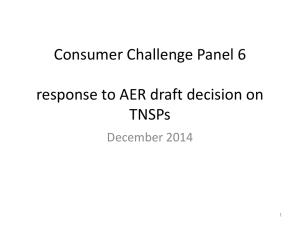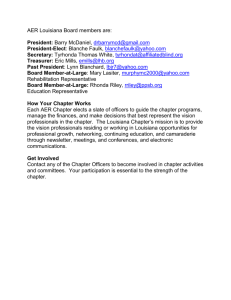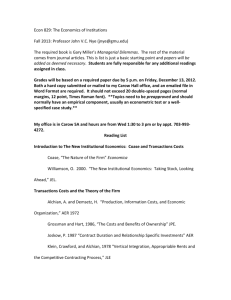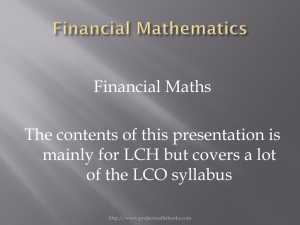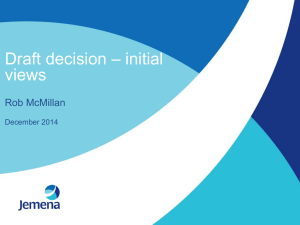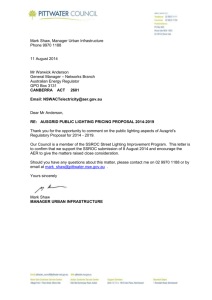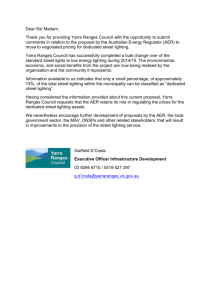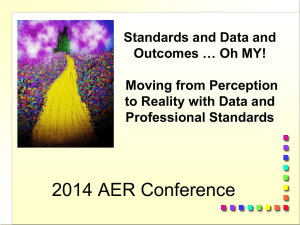Aerospace Science and Engineering
advertisement
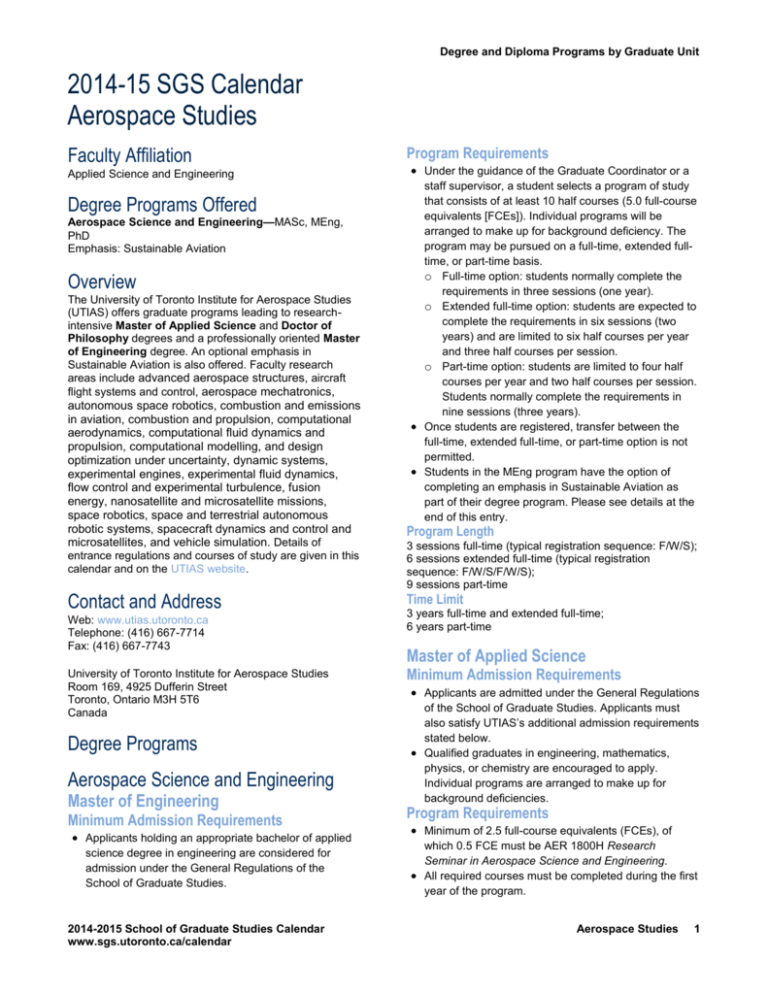
Degree and Diploma Programs by Graduate Unit 2014-15 SGS Calendar Aerospace Studies Faculty Affiliation Applied Science and Engineering Degree Programs Offered Aerospace Science and Engineering—MASc, MEng, PhD Emphasis: Sustainable Aviation Overview The University of Toronto Institute for Aerospace Studies (UTIAS) offers graduate programs leading to researchintensive Master of Applied Science and Doctor of Philosophy degrees and a professionally oriented Master of Engineering degree. An optional emphasis in Sustainable Aviation is also offered. Faculty research areas include advanced aerospace structures, aircraft flight systems and control, aerospace mechatronics, autonomous space robotics, combustion and emissions in aviation, combustion and propulsion, computational aerodynamics, computational fluid dynamics and propulsion, computational modelling, and design optimization under uncertainty, dynamic systems, experimental engines, experimental fluid dynamics, flow control and experimental turbulence, fusion energy, nanosatellite and microsatellite missions, space robotics, space and terrestrial autonomous robotic systems, spacecraft dynamics and control and microsatellites, and vehicle simulation. Details of entrance regulations and courses of study are given in this calendar and on the UTIAS website. Contact and Address Web: www.utias.utoronto.ca Telephone: (416) 667-7714 Fax: (416) 667-7743 University of Toronto Institute for Aerospace Studies Room 169, 4925 Dufferin Street Toronto, Ontario M3H 5T6 Canada Degree Programs Aerospace Science and Engineering Master of Engineering Minimum Admission Requirements Applicants holding an appropriate bachelor of applied science degree in engineering are considered for admission under the General Regulations of the School of Graduate Studies. 2014-2015 School of Graduate Studies Calendar www.sgs.utoronto.ca/calendar Program Requirements Under the guidance of the Graduate Coordinator or a staff supervisor, a student selects a program of study that consists of at least 10 half courses (5.0 full-course equivalents [FCEs]). Individual programs will be arranged to make up for background deficiency. The program may be pursued on a full-time, extended fulltime, or part-time basis. o Full-time option: students normally complete the requirements in three sessions (one year). o Extended full-time option: students are expected to complete the requirements in six sessions (two years) and are limited to six half courses per year and three half courses per session. o Part-time option: students are limited to four half courses per year and two half courses per session. Students normally complete the requirements in nine sessions (three years). Once students are registered, transfer between the full-time, extended full-time, or part-time option is not permitted. Students in the MEng program have the option of completing an emphasis in Sustainable Aviation as part of their degree program. Please see details at the end of this entry. Program Length 3 sessions full-time (typical registration sequence: F/W/S); 6 sessions extended full-time (typical registration sequence: F/W/S/F/W/S); 9 sessions part-time Time Limit 3 years full-time and extended full-time; 6 years part-time Master of Applied Science Minimum Admission Requirements Applicants are admitted under the General Regulations of the School of Graduate Studies. Applicants must also satisfy UTIAS’s additional admission requirements stated below. Qualified graduates in engineering, mathematics, physics, or chemistry are encouraged to apply. Individual programs are arranged to make up for background deficiencies. Program Requirements Minimum of 2.5 full-course equivalents (FCEs), of which 0.5 FCE must be AER 1800H Research Seminar in Aerospace Science and Engineering. All required courses must be completed during the first year of the program. Aerospace Studies 1 Graduate Programs A thesis based on research or development, selected in consultation with the student's supervisor. Research performance is assessed by a Research Assessment Committee (RAC), which includes the student's supervisor. MASc students are anticipated to complete their degree requirements in 20 months. Students interested in pursuing a PhD degree, who have achieved excellent performance in an MASc program at UTIAS, are encouraged to transfer directly into a PhD program, under the same supervisor, at the end of their first year of MASc studies. Approval for transfer is based on the student’s research ability, research progress during the first year, and academic standing. Students transferring from an MASc to a PhD program shall be referred to as "transfer students." Students in the MASc program have the option of completing an emphasis in Sustainable Aviation as part of their degree program. Please see details at the end of this entry. Program Length 5 sessions full-time (typical registration sequence: F/W/S/F/W) Time Limit 3 years full-time Doctor of Philosophy Minimum Admission Requirements Applicants are admitted under the General Regulations of the School of Graduate Studies. Applicants must also satisfy UTIAS’s additional admission requirements stated below. An MASc degree in engineering, mathematics, physics, or chemistry and demonstrated ability to perform advanced research. Applicants with an appropriate bachelor's degree from a recognized university who wish to pursue PhD studies at UTIAS will initially be admitted into the MASc program and will be considered for transfer into the PhD program. Program Requirements Full-time continuous registration for every session, including the Summer session, until all degree requirements are completed. PhD students starting with an MASc or MEng degree must spend a minimum of two years in the program. Transfer students spend a minimum of three years in the program from the date of registration in the MASc program. A flexible-time PhD option may be available to practising professionals, upon approval by the graduate unit. Full-time registration is required for the first four years of study, and part-time registration is expected for the remaining period of study within the normal length. Following acceptance into a PhD program, the student shall undertake a program of study under the guidance 2 Degree and Diploma Programs by Graduate Unit of a Doctoral Examination Committee (DEC) which includes the student's supervisor. Coursework and a thesis which must be based on research conducted while registered for the PhD program. PhD students starting with an MASc or MEng degree require 2.0 full-course equivalents (FCEs). Transfer students need 1.0 FCE in addition to the 2.5 FCEs completed prior to the MASc to PhD transfer for a total of 3.5 FCEs. All courses must be completed during the first two years in the PhD program. A student with a master's degree in a discipline appropriate to the field of PhD study is anticipated to complete the PhD program on a full-time basis in less than four years. The anticipated period for transfer students is less than five years from the date of registration in the MASc program. The DEC plays an important role in assisting students to meet this goal. The functions of the DEC are to: o ascertain the suitability of the student for advanced research, o assess the thesis topic, o conduct formal reviews of the student’s progress at least once a year (unsatisfactory progress may result in the termination of the student’s candidacy), and o provide first assessment of the completed thesis. Program milestones: o The first DEC meeting is held within six months of PhD program start (or date of transfer for transfer students), within 12 months for flexible-time PhD students; the aim is to identify the topic and scope of the thesis. o The second DEC meeting (approximately 1.5 years after PhD start, within 24 months for flexible-time PhD students) is the Qualifying Examination, which determines whether the student should continue in the program or whether his or her candidacy should be terminated. o Subsequent DEC meetings are held at least once a year. Upon thesis completion, the student presents the thesis at a Departmental Doctoral Seminar before defending it at the Doctoral Final Oral Examination as prescribed under the SGs Degree Regulations in this calendar. Prior to convocation, PhD students must prepare at least one formal manuscript, based on the thesis, for publication in refereed journals or refereed conference proceedings. Students in the PhD program have the option of completing an emphasis in Sustainable Aviation as part of their degree program. Please see details at the end of this entry. Program Length 4 years full-time; 5 years direct-entry; 6 years flexible-time 2014-2015 School of Graduate Studies Calendar www.sgs.utoronto.ca/calendar Degree and Diploma Programs by Graduate Unit Time Limit 6 years full-time; 7 years direct-entry; 7 years transferfrom-master's; 8 years flexible-time Emphasis: Sustainable Aviation Doctoral-stream (MASc/PhD) students must successfully complete: At least two half courses (1.0 FCE) from: AER 1303H, AER 1304H, AER 1306H, AER 1308H, AER 1310H, AER 1316H, AER 1318H, AER 1319H, AER 1403H, AER 501H, AER 510H, CIV 1307H, PHY 1498H, PHY 2504H, PHY 2505H, CHE 1123H, JCC 1313H. AER 1315H (0.5 FCE). A thesis in an area of relevance to sustainable aviation with approval of the Scientific Committee. Master of Engineering (MEng) students must successfully complete: At least five half courses (2.5 FCEs) from: AER 1303H, AER 1304H, AER 1306H, AER 1308H, AER 1310H, AER 1316H, AER 1318H, AER 1319H, AER 1403H, AER 501H, AER 510H, CIV 1307H, PHY 1498H, PHY 2504H, PHY 2505H, CHE 1123H, JCC 1313H. AER 1315H (0.5 FCE). Course List This list represents course offerings at the time of publication. Course descriptions are available on the UTIAS website. Courses marked (PR) have prerequisites. Aircraft Flight Systems AER 0503H Aeroelasticity AER 1202H Advanced Flight Dynamics AER 1211H Human Control of Flight Systems AER 1214H Airplane Dynamics (Flight Laboratory) AER 1215H Aerodynamics and Flight Mechanics of Rotorcraft Aerodynamics, Fluid Dynamics, and Propulsion AER 0510H Aerospace Propulsion AER 1301H Kinetic Theory of Gases AER 1303H Advanced Fluid Mechanics (PR) AER 1304H Fundamentals of Combustion AER 1306H Special Topics in Reacting Flows AER 1308H Introduction to Modern Flow Control AER 1310H Turbulence Modelling 2014-2015 School of Graduate Studies Calendar www.sgs.utoronto.ca/calendar AER 1311H Unsteady Gasdynamics AER 1315H Sustainable Aviation AER 1318H Topics in Computational Fluid Dynamics AER 1319H Finite Volume Methods for Computational Fluid Dynamics AER 1320H Air-Breathing Propulsion AER 1322H Modern Aircraft Propulsion (prerequisite: AER 0510 or equivalent; undergraduatelevel training in compressible flow) Structures and Multidisciplinary Optimization AER 0501H Advanced Mechanics of Structures AER 1403H Advanced Aerospace Structures (PR) AER 1416H Numerical Methods for Uncertainty Quantification Sustainable Aviation AER 1316H Fundamentals of Computational Fluid Dynamics Space Systems Engineering AER 0506H Spacecraft Dynamics and Control I AER 0525H Robotics AER 1503H Spacecraft Dynamics and Control II AER 1512H Multibody Dynamics AER 1513H State Estimation for Aerospace Vehicles AER 1514H Mobile Robotics AER 1515H Intelligent Robotics AER 1520H Microsatellite Design I AER 1521H Microsatellite Design II Engineering Physics AER 0507H Introduction to Fusion Energy AER 1717H Applied Plasma Physics I (reading course) AER 1720H Applied Plasma Physics II (reading course) Aerospace Studies 3 Graduate Programs Research Seminars and Professional Courses AER 1800H Research Seminar in Aerospace Science and Engineering (for first-year MASc students only) AER 1810H MEng Project (for MEng students only) JDE 1000H Ethics in Research (Students registered in the MASc or PhD programs are required to participate in this non-credit seminar course during their first or second session of registration. This course must be completed in order to graduate.) 4 Degree and Diploma Programs by Graduate Unit 2014-2015 School of Graduate Studies Calendar www.sgs.utoronto.ca/calendar
